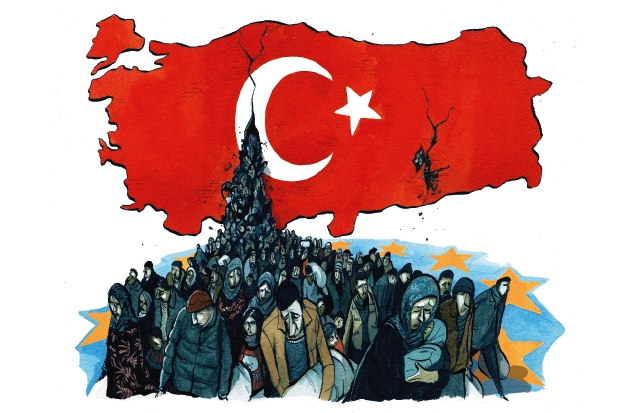As James Forsyth mentioned earlier this week, things could get much worse in Turkey. Indeed, they will. Europe’s hope that Turkey will continue to soak up migrants is at best naive; at worst, irresponsible.
Europe desperately needs Turkey to serve as a migrant waiting room on its borders. In exchange, it has offered an acceleration of the EU admission process. In November, Turkey was promised visa-free travel to the Schengen zone by 2016. In December, after five years of standstill, negotiations concerning economic and monetary policies linked to Turkey’s EU membership were reopened.
This entire deal rests on the peculiar idea that, if given the chance, Turkey would be a Europhile with the zeal of a convert. When the incumbent Prime Minister Ahmet Davutoğlu came into office, he declared that January 2015 would be ‘European month’. Soon after, his government inaugurated a five-year European strategy aiming to close all accession chapters in just two years. After the Charlie Hebdo attacks, he marched with the other leaders in Paris. All this was sending a clear message: ‘We are part of Europe. Europe is us, we are Europe.’
However Davutoğlu’s words should be taken like ayran, Turkey’s non-alcoholic national drink: with a pinch of salt. All the cosying up came to nothing when President Erdoğan forcefully supressed the Gezi Park demonstrations. In a symbolic twist, the visiting German Green Party leader wound up tear-gassed at the event. What’s more, it has been suggested recently that Erdoğan’s government may be supporting the Syrian branch of al-Qaeda (Jabhat al-Nusra). Some traced this to a shared conservative Islamist ideology; others to the shared goal of weakening the Kurds, a strategy that is unlikely to find many European allies.
The promise of EU accession is in itself a fundamental paradox. Europe is encouraging Turkey to retain migrants within its borders. In exchange it is promising Turkey EU membership. Presumably, such membership would entail the free movement of people. Then, all poorly-tracked and half-integrated refugees would be free to complete their journey to Europe. The gapping hole in the plan shows just how little thought or credibility the offer of membership has been given.
Why then, has Turkey been entertaining migrant negotiations with the EU? All this boils down to a simple truth that the EU must understand if it wants to continue this pragmatic partnership: Turkey’s foreign policy is an extension of Erdoğan’s domestic policy. The recent negotiations over the migrant crisis have given the President what he wants. He will take particular pride in showing the West that Europe needs Turkey more than Turkey needs Europe.
And make no mistake, Turkey is well aware of its upper hand in these negotiations. In last month’s leaked recordings, Erdoğan told Donald Tusk and Jean-Claude Juncker that with the proposed 3 billion Euro support, Turkey might as well ‘open the doors to Greece and Bulgaria anytime and we can put the refugees on buses’. With Chancellor Merkel flying over for talks with Davutoğlu and Erdoğan every few weeks, it is a sure sign of desperation. Turkey is also well aware that the leaders of Germany and France — two of the most immigrant-strained countries — are both facing elections in 2016 and 2017. It is only a matter of time before the blackmail intensifies.
But the clock is ticking. As Europe struggles for leverage, Turkey continues to take in refugees. Turkey has so far housed 2.5 million immigrants, spending close to $10 billion to date. In the early days of the Syrian civil war, Ankara’s self-confidence committed it to an open-door policy. Only some 10 percent of these refugees are currently living in camps. So far the assimilation has been relatively seamless, thanks to the regional ethnic similarities, Muslim majority and accommodating informal economy.
But now, things are beginning to creak at the seams. This summer, 33 people were killed in the Kurdish town of Suruç by a suicide bomber. In October, an explosion at a peace rally in Ankara took 102 lives. In January, ten Germans were killed in Istanbul’s Sultan Ahmet by an Isis-affiliated bomber.
What is more, a cottage industry of fake-life jackets has been one of the least palatable by-products of the crisis in Turkey. In January the police seized over 1250 non-buoyant jackets from Izmir. In the tradition of ‘Pradda’ bags, the lifejackets were labelled ‘Yamaxa’, rather than Yamaha.
What happens when Turkey reaches capacity? It is time for us to smell the coffee. Turkey has no real interest in bailing out Europe and the EU is running out of things to offer. The real question is this – when will Turkey’s floodgates open?






Comments